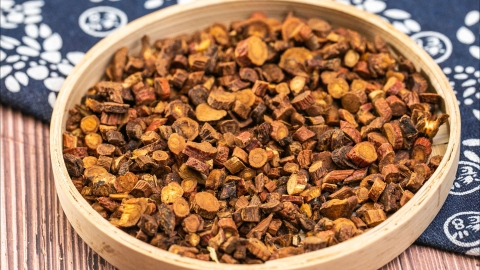What are the functions and benefits of processed licorice root (Zhi Gan Cao)?
Generally speaking, the functions and benefits of processed licorice (Zhi Gancao) include strengthening the spleen and stomach, invigorating qi and restoring pulse, relieving cough and expelling phlegm, clearing heat and detoxifying, and harmonizing the properties of other herbs. Specific details are as follows:

1. Strengthening the Spleen and Stomach
Processed licorice can enhance the functions of the spleen and stomach, promote digestion and absorption, and improve symptoms such as fatigue and poor appetite caused by spleen weakness. It is often used together with herbs like ginseng (Ren Shen) and white atractylodes (Bai Zhu) to enhance its spleen-strengthening effects.
2. Invigorating Qi and Restoring the Pulse
Processed licorice has the function of invigorating qi, improving symptoms such as irregular pulse and palpitations caused by qi deficiency. In treating conditions like insufficient heart qi and inadequate blood vessel filling, processed licorice is often used in large amounts and combined with herbs such as ginseng and donkey-hide gelatin (E Jiao).
3. Relieving Cough and Expelling Phlegm
Licorice significantly alleviates cough symptoms. Whether the cough is due to cold wind, heat wind, or excessive phlegm, processed licorice can be combined with other appropriate herbs to achieve cough-relieving and phlegm-expelling effects. For example, for cold wind cough, it can be used together with ephedra (Ma Huang) and bitter apricot seed (Ku Xing Ren); for heat wind cough, it can be combined with mulberry leaf (Sang Ye) and bitter apricot seed.
4. Clearing Heat and Detoxifying
Processed licorice has certain effects of clearing heat and detoxifying and can be used to treat symptoms such as heat-toxic sores, abscesses, and sore throat. In treating heat-toxic sores and abscesses, processed licorice can be used alone or together with herbs like honeysuckle (Jin Yin Hua) and forsythia (Lian Qiao). For sore throat, it can be combined with herbs like scrophularia (Xuan Shen) and wheat winter (Mai Dong).
5. Harmonizing the Properties of Other Herbs
Processed licorice often plays a role in harmonizing other herbs. It can moderate the potent properties of other herbs, allowing them to work together more effectively in treatment. It can also reduce the toxicity and side effects of certain herbs.
Processed licorice should not be used together with herbs such as Euphorbia pekinensis (Jing Da Ji), Genkwa flower (Yuan Hua), and Sargassum (Gan Sui). Additionally, individuals with excessive dampness and fullness in the middle jiao should consult a physician before using processed licorice. When using processed licorice, it is important to follow the guidance and advice of a physician to ensure safe and effective medication use.





